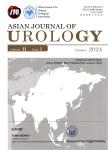The application of virtual reality training for anastomosis during robot-assisted radical prostatectomy
作者机构:Department of UrologyChanghai HospitalSecond Military Medical UniversityShanghaiChina Department of NursingChanghai HospitalSecond Military Medical UniversityShanghaiChina
出 版 物:《Asian Journal of Urology》 (亚洲泌尿外科杂志(英文))
年 卷 期:2021年第8卷第2期
页 面:204-208页
核心收录:
学科分类:1002[医学-临床医学] 100210[医学-外科学(含:普外、骨外、泌尿外、胸心外、神外、整形、烧伤、野战外)] 10[医学]
基 金:supported by the National Natural Science Foundation of China(No.81430058) the Precision Medicine Program of Second Military Medical University(No.2017JZ35)
主 题:Robotic surgery Radical prostatectomy Training Virtual reality
摘 要:Objective:To investigate the application of virtual reality training in vesicourethral anastomosis during robot-assisted radical prostatectomy(RARP).Methods:Three certified robotic urologists who underwent virtual reality training were enrolled in the study *** other three without training were enrolled in the control *** were recorded before and after the *** a total of 18 patients undergoing RARP were enrolled and randomized assigned to receive anastomosis procedures with certified urologists who either obtained or did not obtain *** quality of the anastomosis was ***:For the virtual training evaluation,the overall score was significantly improved from 65.0±10.8 to 92.7±3.5(p=0.014);the time of anastomosis was shortened;the economy of motion improved;instrument collisions decreased after training(p0.05).Besides,the effectiveness of the virtual training was evaluated in the 18 real anastomosis procedures which were completed either by three urologists with training or three urologists without *** intriguingly,the average time of anastomosis was shortened from 40.0±12.4 min to 25.1±7.1 min(p=0.015).The parameters including time of operation,creatinine level of drainage,postoperative hospital stay and duration of catheter drainage were comparable before and after *** leakages,which were observed in procedures by doctors without training,needed salvage sutures by a senior ***:Virtual reality training enabled surgeons to become quickly familiar with robotic system manipulation,improved their skills for vesicourethral anastomosis and shortened the learning curve,thus helping them operate with high efficacy and quality.



